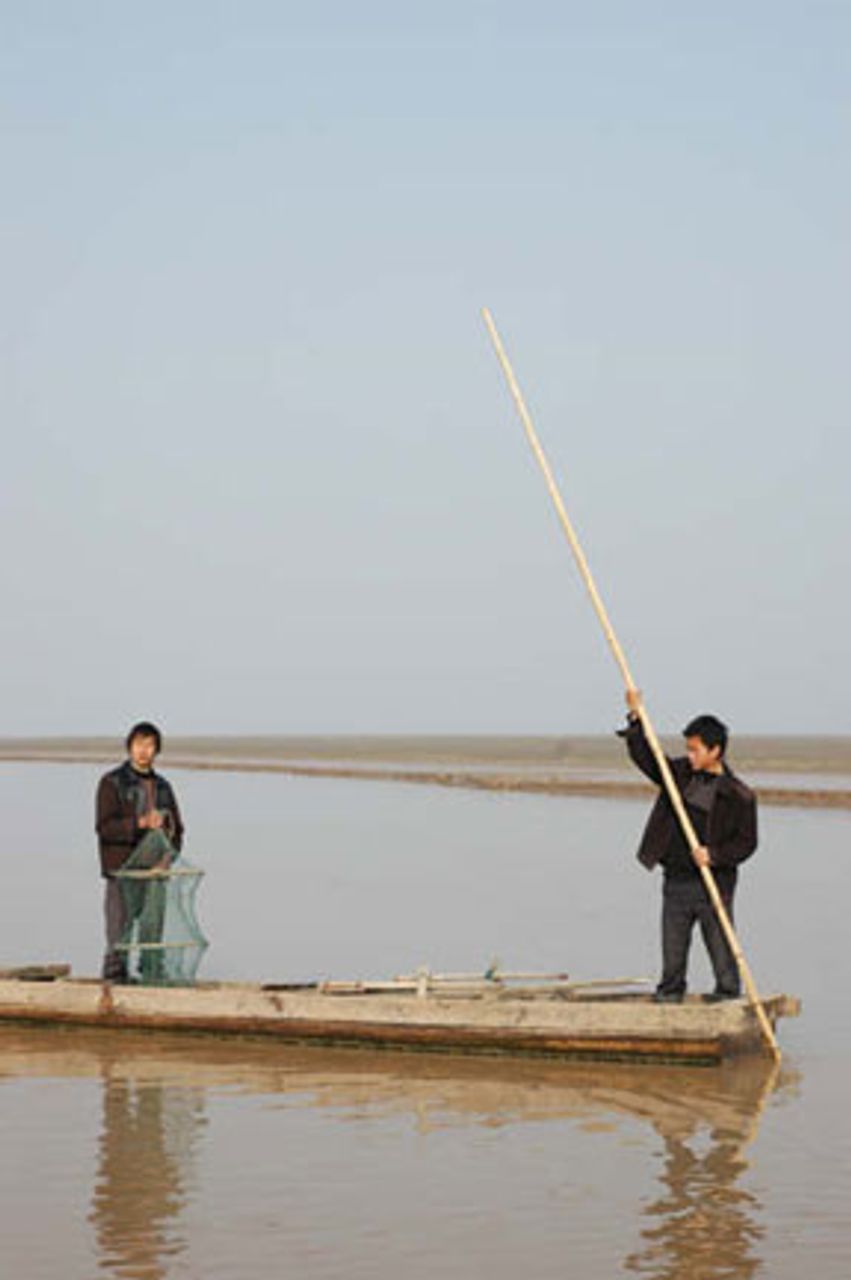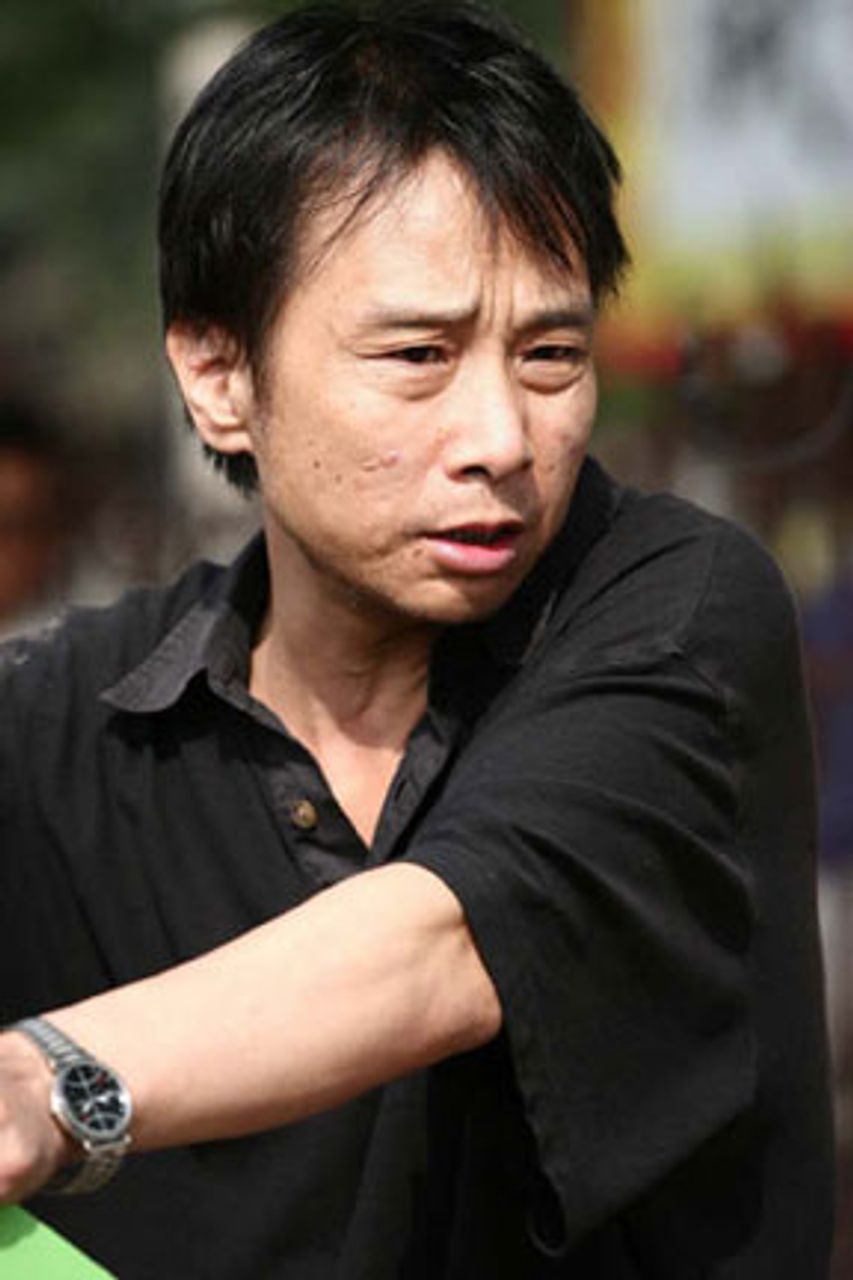 River People
River PeopleAt the recent San Francisco film festival, we had the opportunity to view He Jianjun’s River People, a film about an extended family of fishermen living on China’s Yellow River. The existence depicted is a harsh, almost entirely joyless one, of floating on or slogging through the broad river’s muddy waters. [See “San Francisco International Film Festival 2009—Part 1: Painful truths,” 20 May 2009]
At the center of the film are two young cousins, Baowa and Laba. The latter is resigned to his condition. He hated school, sleeping through his classes. Laba also narrates River People. “I am good at rowing a boat. I like fishing. I am doomed to fish all my life,” he tells us at one point.
Baowa, on the other hand, has had a few years of schooling and longs to leave the river behind. He comes into conflict with his father, Laba’s uncle, who has already lost various family members to the lure of the outside world.
 Director He Jianjun
Director He JianjunThe film is fiction, but very close to documentary in look and feel. The performers come from the fishing family itself. River People is a serious, honest work. At this point some of the most determined efforts to reproduce social life, and the life of the oppressed in particular, come from China. Given the history of the Beijing regime and Maoism, that a good deal of ideological confusion is admixed with the artistic realism should not come as a surprise.
He Jianjun (born in Beijing 1960) is an interesting figure, who made the remarkable Postman—a portrait of Beijing’s shabby “Happiness District”—in the mid-1990s, a film that was banned by Chinese authorities until 2004.
He was kind enough to agree to respond to a number of questions sent by e-mail. The filmmaker’s answers were subsequently translated into English.
* * * * *
WSWS: Can you explain why you chose to make a film about these “River People”?
He Jianjun: Initially, I had no plan for such a movie. In the summer of 2005, I met this family [of fishermen] when I was doing pre-production scene selection on the banks of the Yellow River in Dali County in Shanxi province.
I was preparing another film, Da Feng Shou [The Harvest]—a movie about the contemporary living conditions of Chinese peasants, which received a Hubert Bals Fund script development grant from the Rotterdam Film Festival.
At the time, I already knew the basic conditions of this fishing family as a result of talking to them. First, they were not locals, but came from Yangcheng in Jiangsu province [on China’s east coast]. For three generations, they have been dependent on the water and live on boats, making a living by fishing.
They initially fished in the Yangtze River, but were forced to relocate to the Huai River [midway between the Yellow and Yangtze Rivers], because of the water pollution. When the Huai River also became polluted, they shifted to the Wei River [the largest tributary of the Yellow River], only to encounter the same pollution. So they ended up on the Yellow River.
They are not alone—along the banks of the Yellow River, there are nearly a hundred households, comprising several thousand people, living like them. And all of them come from the same place, Yangcheng in Jiangsu province.
Later, after Da Feng Shou was shipwrecked because of a lack of money to film it, I took up the idea of making a movie about these river people. Their extremely fierce determination to stay on, and their love for and connection to the water generated respect in my mind, which encouraged me to finish making this movie.
WSWS: Are their conditions typical of people fishing on rivers in China? Are their conditions worsening or improving?
He: In fact, I think the conditions of these people are typical of the fishermen’s life. Genuine fishermen are unwilling to leave the water, just as fish cannot be separated from the water or they die. Therefore, I think the living conditions of these people, for better or worse, will be determined by the quality of the water.
If the water quality is bad, life will be naturally hard for them. Of course, if the water quality is good, their life will improve. This is because apart from fishing, these people know no other kind of work.
WSWS: The relations of these people with nature are harsh, and the relations between the people are harsh. It is understandable why one of the characters wants to leave the river, but this does not help the others, who are still stuck in these difficult circumstances. What is your own attitude toward these social conditions?
He: This movie is entirely constructed from the standpoint of Laba [the film’s young narrator] who chooses to stay on, which was also my original idea in making this film. I believe even people who are not living on a river will encounter the same problem—how to make important choices in their own lives and inevitably paying a price for the choices they make.
In the film, Baowa decides to leave home, but he didn’t in real life. It was an assumption I made, which was based on his actual thinking—leaving [the river] is a possible decision and choice he will make in the future. I know this because during our private conversations he repeatedly told me that he does not want to take over his father’s work and continue to fish in the Yellow River, but he wants to find a job in the city, in order to make a new life.
However, even if he did eventually take such a step and leave home, it would actually be a very hard choice, because his elder brother, who left home, was crushed to death in a coal mine. In other words, there are so many factors involved in making the decision to leave his family. But I believe he will certainly leave home in the future.
WSWS: How do you view the relationship between fiction and documentary? Which do you prefer, and which provides more artistic freedom?
He: That depends on what kind of subject is involved, and the meaning that needs to be expressed. I would consider any means of artistic expression, in an eclectic fashion, even combining forms [fiction and documentary], as long as they were helpful for the chosen subject and assisted in bringing out its meaning.
WSWS: What is the impact of the present global economic crisis on Chinese filmmakers and the Chinese film industry?
He: There is almost no impact. In recent years, many filmmakers have been trying every means, sparing no effort, in an attempt to lure audiences into the cinema. Today, films backed by major investors are dominating the major Chinese markets.
WSWS: You had censorship problems in the past, what is the general situation now in regard to official censorship and freedom of expression?
He: The censorship regulations and methods in a country are determined by the given national conditions. Now Chinese films are becoming more commercial, so for a film to be commercial and wholesome entertainment is the major criterion for making it through the film censorship system.
WSWS: Which films do you plan to make, or would you like to make, in the future?
He: I am preparing one to two subjects at the moment; discussions with colleagues in the film industry will determine which one we will begin taking through the filming process.
